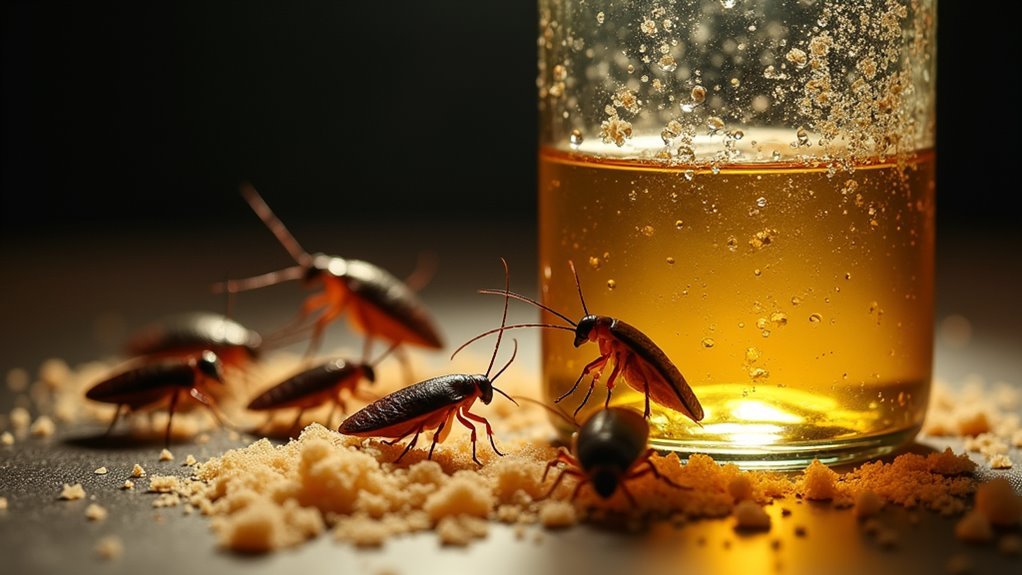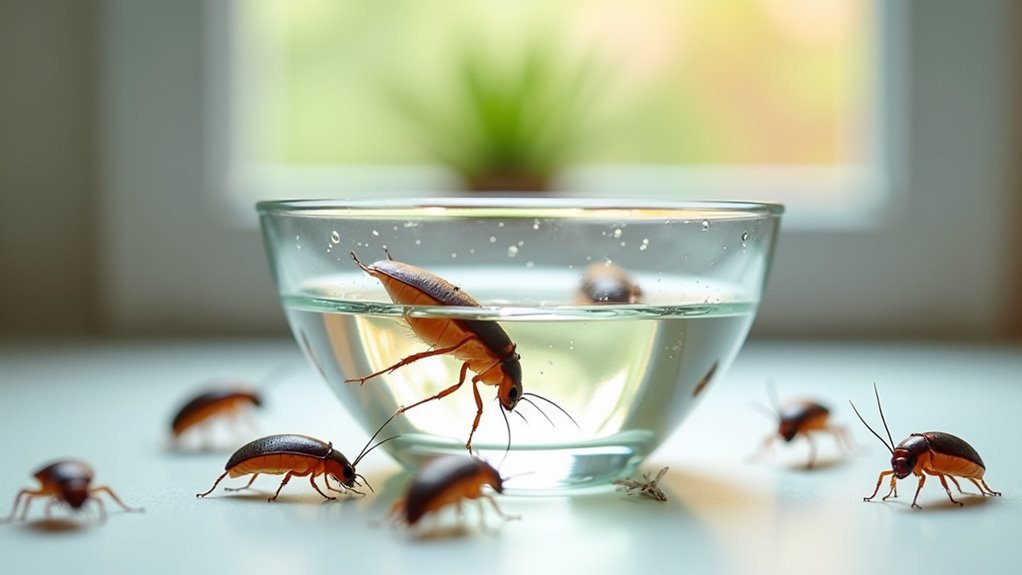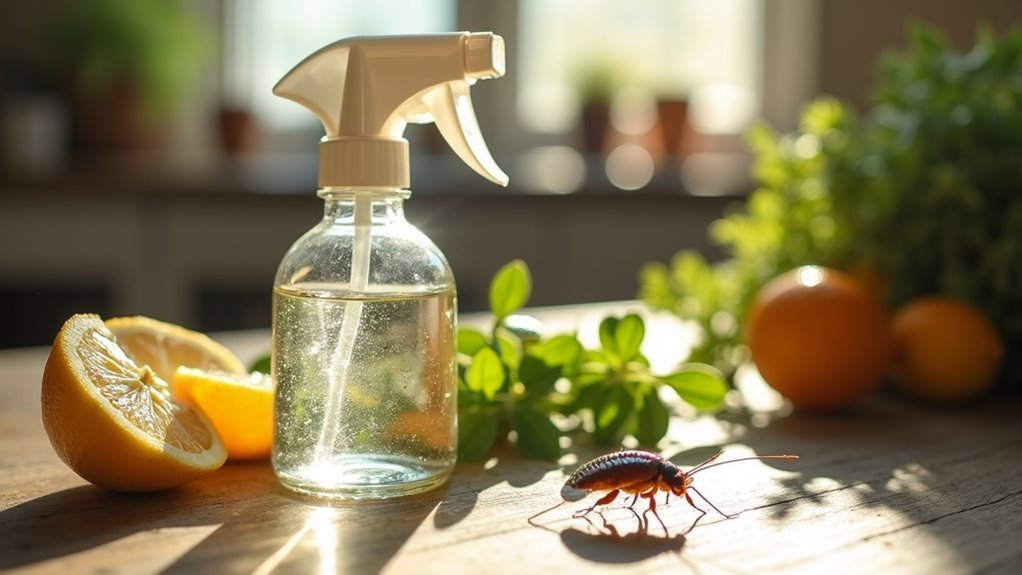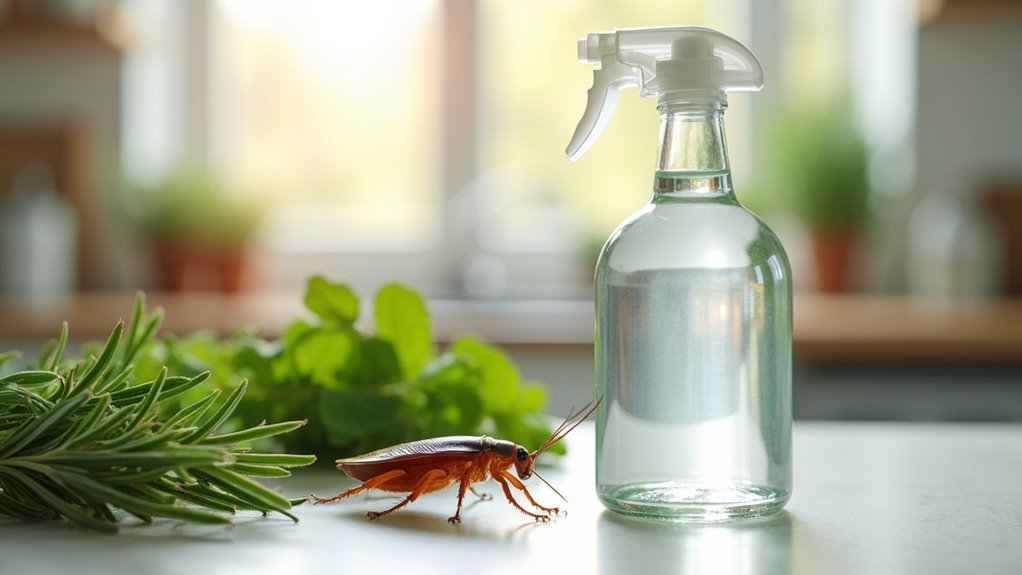Vinegar deters cockroaches because its acetic acid overwhelms their highly sensitive olfactory receptors, disrupting their ability to detect food sources and navigate using chemical trails. When you spray undiluted white vinegar in areas where roaches frequent, you’re fundamentally creating a sensory barrier that makes the environment uninhabitable for them. The strong acidic smell interferes with their communication systems and forces them to seek alternative locations. Understanding proper application techniques and concentration ratios will maximize your success.
Understanding Cockroach Behavior and Sensory Systems

Most cockroaches rely on sophisticated sensory systems that make them incredibly efficient at finding food, water, and shelter in your home. Their cockroach behavior centers around these highly developed olfactory receptors that detect various scents and pheromones. You’ll find they’re particularly skilled at locating food sources through smell alone.
These nocturnal pests communicate and navigate using chemical signals, creating invisible trails that guide other roaches to prime locations. They thrive in dark, warm spaces like cracks and crevices where they can hide during daylight hours.
However, strong odors like vinegar disrupt their sensory systems considerably. When you introduce powerful scents into their environment, you interfere with their ability to follow scent trails and locate sustenance, making your home far less appealing to these unwanted visitors.
The Science Behind Vinegar’s Acidic Properties
Since vinegar’s primary component is acetic acid, it creates a powerful chemical barrier that directly targets cockroaches’ biological systems. When you apply vinegar as a repellent, its acidic nature disrupts these pests’ olfactory receptors, making it nearly impossible for them to detect food sources. The strong smell overwhelms their sensory systems, creating an environment they’ll actively avoid.
You’ll find that undiluted white vinegar works most effectively because the concentrated acetic acid interferes with cockroaches’ respiratory and digestive functions. This chemical disruption goes beyond simple odor masking – it actually impairs their ability to navigate and survive in treated areas.
The acid also eliminates food residue odors that typically attract these pests, breaking the scent trails they rely on for navigation and feeding.
How Vinegar Disrupts Roach Navigation and Communication

Beyond affecting their respiratory systems, vinegar creates chaos in cockroaches’ sophisticated navigation network.
When you apply vinegar to surfaces, you’re disrupting their ability to communicate and navigate effectively through your home.
The strong acidic scent overwhelms cockroaches’ olfactory receptors, making it nearly impossible for them to:
- Detect and follow pheromone trails left by other roaches
- Locate food sources they’d normally find easily
- Navigate familiar routes through your living spaces
Vinegar’s acidic nature interferes with their respiratory functions, preventing proper pheromone communication between cockroaches.
You’ll find that treated areas become inhospitable environments where roaches can’t gather or coordinate their movements.
Vinegar as a Natural Cleaning Agent Against Food Sources
Cockroaches’ survival depends heavily on finding reliable food sources, and vinegar’s powerful cleaning properties directly target this fundamental need. When you use vinegar as a natural cleaning agent, you’re eliminating the food residues and odors that attract these pests to your home.
Regular cleaning with diluted vinegar solution removes organic materials from countertops, floors, and other surfaces where roaches typically forage. This disrupts their ability to locate nourishment, helping reduce likelihood of cockroach infestation.
| Surface Type | Cleaning Frequency | Vinegar Concentration |
|---|---|---|
| Countertops | Daily | 1:1 ratio |
| Floors | Weekly | 1:2 ratio |
| Appliances | Bi-weekly | 1:1 ratio |
| Cabinets | Monthly | 1:2 ratio |
| Baseboards | Monthly | 1:1 ratio |
Vinegar’s strong odor may also repel roaches while sanitizing surfaces, creating an inhospitable environment that discourages their presence.
Creating Effective Vinegar-Based Spray Solutions

While cleaning surfaces removes existing attractants, creating a targeted vinegar spray solution allows you to treat specific areas where cockroaches commonly hide and travel. You’ll need equal parts white vinegar and water to create this natural repellent that’s effective in repelling roaches through its strong odor.
To maximize your spray’s effectiveness:
- Target baseboards, cracks, and crevices where roaches typically hide
- Add essential oils like peppermint or lavender to enhance repellent properties
- Reapply regularly since effectiveness diminishes over time in high-traffic areas
While this vinegar kill approach doesn’t actually eliminate roaches, it serves as both a cleaning agent and deterrent.
The solution disrupts their olfactory senses and removes food residues that attract them, making it an essential component of thorough roach prevention.
Strategic Application Areas for Maximum Deterrent Effect
You’ll achieve maximum cockroach deterrent effect by targeting three critical zones where these pests are most active.
Focus your vinegar applications on kitchen surfaces where food preparation occurs, entry points like doorways and windows where roaches infiltrate your home, and hidden nesting areas such as baseboards and corners where they establish colonies.
Strategic placement in these high-impact locations guarantees you’re disrupting their feeding, movement, and breeding patterns simultaneously.
Kitchen Surface Treatment
The kitchen serves as cockroaches’ primary target due to its abundance of food sources and moisture, making strategic surface treatment essential for effective deterrence.
You’ll need to clean kitchen surfaces regularly using equal parts vinegar and water to eliminate residue that attracts these pests.
Focus your vinegar for roach control efforts on these high-risk areas:
- Countertops and appliance zones – Wipe behind refrigerators, ovens, and microwaves where crumbs accumulate
- Stoves and sinks – Target moisture-rich areas where food particles harbor
- Cabinets and baseboards – Apply vinegar solution along entry points and storage spaces
Don’t forget to treat trash cans and recycling bins regularly.
The vinegar solution will neutralize odors from potential food sources while deterring roaches with its strong scent.
Entry Point Barriers
Creating effective entry point barriers requires targeting the specific pathways cockroaches use to infiltrate your home. Apply vinegar strategically along door frames, windowsills, and wall cracks to disrupt cockroaches’ olfactory senses and create an unwelcoming barrier.
These pest control methods work by eliminating food residues and odors that typically attract roaches to entry points.
Focus on areas near plumbing fixtures like sinks and pipes, where roaches seek moisture access. Don’t overlook gaps around appliances such as refrigerators and stoves—spray vinegar in these spaces to deter roaches from establishing hiding spots in warm, dark environments.
Combining vinegar treatment with sealing cracks maximizes effectiveness. This dual approach creates a thorough defense system that makes your home considerably less hospitable to infiltrating cockroaches.
Hidden Nesting Areas
While entry point barriers form your first line of defense, cockroaches that breach these barriers will seek out hidden nesting areas where vinegar applications become essential for long-term control.
Vinegar deters cockroach species by disrupting their olfactory receptors with its strong scent, making these prime locations inhospitable for repelling and killing roaches.
Target these critical hidden nesting areas:
- Under sinks and behind appliances – Apply vinegar solution regularly to eliminate moisture and food residues
- Cracks and crevices near plumbing – Focus where pipes meet walls or floors where leaks occur
- Behind cabinets in seldom-touched spots – Clean and spray these dark areas consistently
You’ll need to maintain proactive measures by establishing a consistent vinegar application routine in these hidden spaces, ensuring potential nesting sites remain repellent.
Different Types of Vinegar and Their Effectiveness
You’ll find that white vinegar stands out as your most powerful weapon against cockroaches due to its high acetic acid concentration that effectively disrupts their sensory navigation.
Apple cider vinegar offers a milder alternative, though its lower acidity and sweeter scent make it less reliable for consistent roach deterrence.
The concentration levels in your chosen vinegar directly impact its effectiveness, with higher acidity percentages delivering stronger repellent results.
White Vinegar Potency
When choosing vinegar for cockroach deterrence, white vinegar stands out as your most powerful option due to its high acetic acid concentration that disrupts roaches’ olfactory receptors.
This white vinegar potency makes treated areas unappealing to cockroaches, effectively helping you repel cockroaches from your home.
The high acetic acid content in white vinegar creates these advantages:
- Undiluted application – You can use pure white vinegar for maximum effectiveness
- Homemade sprays – Mix equal parts vinegar and water for broader coverage
- Immediate deterrent effect – The pungent odor prevents roach entry and activity
While white vinegar can successfully deter roaches, remember it’s not a long-term solution for serious infestations.
You’ll achieve better results by combining vinegar with other pest control methods for thorough roach management.
Apple Cider Variations
Apple cider vinegar offers a natural alternative to white vinegar, though it comes with distinct trade-offs that affect its cockroach-deterring capabilities.
You’ll find that apple cider vinegar can repel cockroaches through its strong odor, but it’s not scientifically proven superior to white vinegar. Its lower acetic acid concentration makes it less effective for pest control purposes.
When choosing between vinegars as a natural deterrent, consider that darker apple cider vinegar leaves stains on surfaces, making it less ideal as a cleaning agent.
You should also know it attracts fruit flies, potentially counteracting your pest control efforts.
While apple cider vinegar works as a deterrent, white vinegar’s higher acetic acid content and superior cleaning properties make it the more effective choice for cockroach control.
Concentration Impact Levels
Understanding concentration levels becomes essential when selecting vinegar for cockroach control, as the acetic acid content directly determines effectiveness.
You’ll find that higher concentrations create stronger barriers against these pests, while weaker solutions won’t deter them effectively.
The concentration of your vinegar solution impacts how well it disrupts cockroaches’ olfactory receptors, making it harder for them to navigate toward food sources.
Undiluted white vinegar provides maximum repelling power, but you can create effective mixtures for regular use.
Consider these concentration guidelines for ideal results:
- Use undiluted white vinegar for maximum effectiveness in repelling cockroaches
- Mix equal parts vinegar and water for enhanced capabilities over weaker solutions
- Apply higher concentration mixtures more frequently as acetic acid effectiveness diminishes over time
Combining Vinegar With Other Natural Deterrents
While vinegar works effectively on its own, you’ll amplify its cockroach-deterring power by combining it with other natural ingredients. Essential oils like peppermint or lavender enhance vinegar’s repellent properties by disrupting cockroaches’ olfactory systems with their strong scents.
| Natural Deterrent | Benefit When Combined |
|---|---|
| Baking soda | Attracts roaches while vinegar eliminates them |
| Dish soap | Improves solution adhesion to surfaces |
| Essential oils | Enhances repelling effects through scent |
You’ll maximize effectiveness by incorporating vinegar treatments into a thorough cleaning routine. Removing food sources and hiding spots reduces cockroach attraction to treated areas. Creating vinegar traps using jars with sticky substances works alongside repellent properties to control populations. These combinations transform simple vinegar into an all-encompassing natural deterrent system.
Proper Concentration Ratios for Optimal Results
Getting the right concentration determines whether your vinegar solution will effectively repel cockroaches or simply waste your effort.
Different concentration ratios create varying deterrent effects, making it vital to understand what works best for your roach control methods.
Understanding which vinegar concentration ratio works best directly impacts your success in naturally deterring household roaches.
For ideal natural remedies, consider these proven concentration ratios:
- Equal parts mixture: Combine 50% white vinegar with 50% water for your homemade spray – this balanced ratio provides effective repelling power while being economical.
- Undiluted vinegar: Use 100% white vinegar in high-infestation areas where you need maximum deterrent effect and stronger olfactory disruption.
- Enhanced blend: Mix equal parts vinegar-water solution with 5-10 drops of peppermint essential oil per cup to boost repelling capabilities.
Apply your chosen concentration every few days, focusing on kitchens and bathrooms where these natural remedies work most effectively.
Maintenance and Reapplication Schedules
Three key factors determine your vinegar treatment’s long-term success: frequency, timing, and consistency.
You’ll need to reapply vinegar solutions every few days in high-traffic areas where cockroaches commonly invade. Weekly maintenance involves cleaning surfaces with vinegar to eliminate food residues and odors that attract these pests.
Create a homemade spray using equal parts vinegar and water for ongoing home protection. Apply this barrier solution to baseboards and potential entry points regularly.
After heavy rainfall or seasonal changes that drive roaches indoors, immediate reapplication becomes essential to reestablish your repellent environment.
Remember that vinegar’s effectiveness diminishes over time, so consistent monitoring and reapplication alongside other pest control measures will help maintain your roach-free home successfully.
Safety Considerations When Using Vinegar Around Pets
When you’re using vinegar to deter cockroaches, you’ll want to guarantee your pets stay safe during and after application.
You should store vinegar solutions in secure locations where curious cats and dogs can’t reach them, as accidental ingestion could upset their stomachs.
You’ll also need to ventilate treated areas well since the strong vinegar smell can be unpleasant for your furry companions.
Pet-Safe Vinegar Application
Although vinegar serves as an effective cockroach deterrent, you’ll need to take specific precautions when applying it around your pets.
While vinegar is generally pet-safe, it can cause mild irritation through ingestion or skin contact.
Follow these essential application guidelines:
- Apply vinegar solutions in areas your pets can’t easily access, such as behind appliances, inside cabinets, or under furniture.
- Allow treated surfaces to completely dry before letting pets return to those areas.
- Clean up any excess vinegar solution immediately after application.
The strong vinegar scent naturally deters both roaches and pets from treated locations.
Monitor your pets for signs of discomfort after exposure. If you notice any irritation symptoms, consult your veterinarian promptly for appropriate care and guidance.
Preventing Pet Exposure
Since pets can accidentally ingest vinegar or encounter it through normal exploration, you’ll want to implement proactive measures that minimize their pet exposure risk.
When applying vinegar solutions to prevent roaches, always handle carefully by keeping animals away from treated areas until surfaces dry completely.
Store vinegar and cleaning solutions out of reach in secured cabinets to prevent accidental access.
After application, ventilate the area thoroughly since the strong odor can cause discomfort for sensitive pets.
Monitor your animals closely for any adverse reactions following vinegar use.
Watch for signs of irritation including excessive drooling, vomiting, or unusual behavior.
If you notice any concerning symptoms, consult a veterinarian immediately for professional guidance and appropriate treatment recommendations.
Limitations of Vinegar as a Standalone Solution
While vinegar’s pungent odor can make cockroaches think twice about entering treated areas, it won’t solve your roach problem if you’re dealing with a serious infestation. This natural remedy functions as a deterrent rather than an exterminator, creating significant limitations when used as a standalone solution.
The key restrictions of vinegar include:
- No killing power – Vinegar repels roaches but doesn’t eliminate them or their eggs.
- Temporary effectiveness – You’ll need frequent reapplications as the deterrent properties fade quickly.
- Surface-level treatment – It can’t address entry points or hidden nesting sites where roaches breed.
For severe infestations, you’ll need to combine vinegar with other pest control methods.
While it’s excellent for cleaning food residues that attract roaches, vinegar alone won’t tackle established populations effectively.
Frequently Asked Questions
Does Vinegar Keep Cockroaches Away?
Yes, vinegar’s strong odor disrupts cockroaches’ olfactory system, making treated areas unappealing to them. You can spray undiluted white vinegar or mix it with water to effectively repel roaches naturally.
What Smell Keeps Roaches Away Naturally?
You can repel roaches naturally using strong scents like peppermint oil, lavender, eucalyptus, bay leaves, cucumber peels, and coffee grounds. These odors disrupt their navigation and make treated areas unappealing to cockroaches.
What’s the Best Natural Cockroach Repellent?
You’ll find vinegar’s the most effective natural cockroach repellent. Mix equal parts vinegar and water, then spray around entry points and problem areas. It disrupts their smell sensors while cleaning away attractants.
What Do Cockroaches Hate the Most?
You’ll find cockroaches hate strong acidic scents most, especially undiluted white vinegar. They can’t tolerate peppermint and lavender essential oils either, as these overwhelm their sensitive olfactory systems completely.
In Summary
You’ve discovered that vinegar’s acidic properties effectively disrupt cockroaches’ navigation systems and eliminate their food sources. While it’s a safe, natural deterrent that won’t harm your pets, don’t expect it to solve severe infestations alone. You’ll need to maintain consistent applications and proper concentrations for best results. Remember, vinegar works as part of an integrated approach—combine it with good sanitation and other pest control methods for lasting success.





Leave a Reply